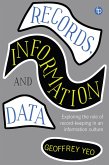This book provides a complete introduction to the rapidly expanding field of Knowledge organization (KO), presenting historical precedents and theoretical foundations in a discursive, intelligible form, covering the philosophical, linguistic and technical aspects. In the contemporary context of global information exchange through linked data, Knowledge organization systems (KOS) need to be represented in standard inter-operable formats. Different formats for KOS representation including MARC, Dublin Core, SKOS and OWL are introduced as well as the application of Knowledge organization to a variety of activities and contexts: education, encyclopedic knowledge, the Internet, libraries, archives, museums, galleries and other institutions collecting and providing access to recorded knowledge.
Key coverage includes:
. ontology and epistemology in KO
. KO structures: lists, hierarchies, facets...
. KO types: tagging, taxonomies, thesauri, classifications...
. conceptual analysis of documents
. applications in the digital age.
Covering theoretical and practical aspects of KO and using real-life examples to illustrate its application, this book will be a valuable resource for students, researchers and practitioners of Knowledge organization, information organization, cataloguing and classification.
Key coverage includes:
. ontology and epistemology in KO
. KO structures: lists, hierarchies, facets...
. KO types: tagging, taxonomies, thesauri, classifications...
. conceptual analysis of documents
. applications in the digital age.
Covering theoretical and practical aspects of KO and using real-life examples to illustrate its application, this book will be a valuable resource for students, researchers and practitioners of Knowledge organization, information organization, cataloguing and classification.
Dieser Download kann aus rechtlichen Gründen nur mit Rechnungsadresse in A, D ausgeliefert werden.









